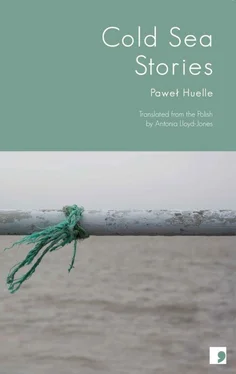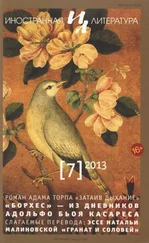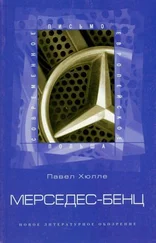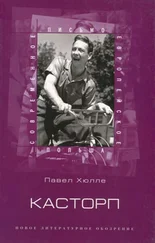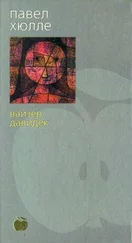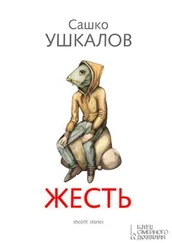But her brother-in-law’s question hung in the air like an unnecessary flourish, and so it had remained in her memory for ever after, as had the image of the chair, sitting in the middle of the room and filling that long moment of silence with a sense of patent and utter redundancy.
The van Dorns’ boat had sailed long ago, and so they had walked to the Vistula Station, down a street that crossed a drawbridge. If only her father had tried to say – without avoiding words of anger – how very upset he was. But he had remained silent throughout the entire journey, and even when they had sat down in an empty carriage on the last train, which trailed across fields flat as a tabletop in the darkness, occasionally jumping a weir or a canal via a narrow little bridge, even when they were sitting so close to each other, staring into the gloom that stretched beyond the window of the puffing, narrow-gauge railway train, not a single word was said. She remembered the lamp swaying on the last carriage as it moved away from the empty little station. And the long sandy road they had walked for several kilometres to reach home.
The next day, she had had to stand in the middle of the chapel and confess her guilt to everyone aloud. Then she had listened to Harmensoon’s reprimands: was she not ashamed to show disobedience to her father? Should she not disdain people who commit the gravest sin and have themselves christened for a second time? Did she not know that music, alcohol and elaborate attire are the atrium of hell? Had she never heard that it was forbidden to exchange a single word with those who had been excluded from the community? To say nothing of taking part in their lascivious, pernicious entertainments? Was she showing due remorse? Did she realise that next time no one would admonish her again?
When he had finished, with her head lowered, she had had to go back to the gallery and take her place among the women. The congregation had started singing Psalm 130: ‘Out of the depths have I cried unto Thee, O Lord.’ She had wanted to join in with the chorus, she had wanted to be one of the pure, strong voices that every day for centuries had gone soaring up from here, straight into the presence of the Lord. But as soon as she opened her mouth, a hollow, husky moan had emerged from her throat. She had tried again, but the words had remained inside her, as if under lock and key. This sense of impotence was a hundred times worse than the fear she had felt as she stood before Harmensoon.
‘It will pass,’ she had thought, ‘it’s temporary.’
But that moment had lasted for four years, and now, as she lay in the empty house, unable to fall asleep under the throng of memories, and also – she knew – because of the stranger’s coal-black eyes, she felt a rising wave of rebellion and despair. Did God really want to punish her quite so severely? If He was just, why had nothing like this happened to Hanna, but to her instead? And where was the Lord the day when the lorries and the people carrying guns had appeared outside the chapel? Maybe only things, houses, animals and plants were real – water, air, earth, the rising and setting of the sun, the clouds, and nothing else?
At the Helkes’ house the owl hooted again. The mouse scratched in the wardrobe. The wind had died down entirely, and suddenly, in the immense silence that now lay over the roofs and trees like an invisible mantle, a terrible shout rang out, ripping the darkness apart. She went up to the window. The man she had fed was walking, staggering in the road. He was waving his arms about, clenching his fists, falling onto the sand, struggling to get up and shouting again, straight at the stars, as if there were someone up there who had to hear him out. From afar he looked like an intoxicated peasant who had taken the wrong road after the fair, and ended up not so much in a strange village, as in a completely different world.
When she went out into the road, he was lying face down on the sand, muttering to himself. He no longer had the strength to stand up, even less to take another step. As she leaned over him and gently touched his head, she felt the angel of death – who had been hovering here for a long time – recede noiselessly into the darkness, letting her pass underneath its invisible wing. As she dragged the heavy, inert body straight into the house, another flash of anxiety ran through her. She had never met this man before, and yet she couldn’t shake off the feeling that his face, now bathed in the weak, amber light of the lamp twinkling by the bed, that this face was not unfamiliar to her, and that those two burning, dark eyes had closely followed her once before now. But she hadn’t time to stop and think about it: once she had removed his shirt and trousers, along with some scabs and a layer of dirt, once she had washed his open wounds, shivers began to make his body shake; his eyes stayed shut as he raved in a fever and refused to drink. It occurred to her that if the stranger died, she wouldn’t be able to manage without Willman. After all, she couldn’t make a coffin on her own, or lay the body in a grave.
III
He was amazed by everything, though he didn’t show it, and said nothing, rather than ask questions. The wardrobe, for instance: it looked as if all the men here wore the same waistcoats, done up not with buttons but sixteen inconvenient hooks and eyes. The dark trousers made of woven cloth and the jacket that looked like an old-fashioned frock coat were also not the most comfortable. He put them on, when she fetched her father’s clothes out of the cupboard, including shirts and underwear. But he refused the black hat, and did so with such a decisive gesture that the startled look in her eyes, which he caught for a moment, must have disconcerted him. Then, as she led him through the village, he couldn’t understand why she was taking him around the houses, opening doors, drawers and wardrobes, as if seeking his approval every single time, even though all the interiors, barns, kitchens and bedrooms, just like the clothes in the wardrobes, the household utensils and trinkets, were all so similar to each other. And why did she lose patience when in the final house, in reply to her clearly inquiring look and gesture, which he couldn’t understand, he had dismissively shrugged his shoulders?
She ran outside, leaving him amid the hazy presence of the people who once lived here. Timidly he touched the table top, walked to and fro about the large room, and drew his fingers across the cool oven tiles. Finally he stood at the window and waited, God knows what for. Flooded with sunlight, the road was empty. Not one, not even the smallest rural sound disturbed the total silence. Pervading the grass-choked vegetable beds, last year’s bean poles and the wild, dried-out sunflowers, pervading the moss on the sill, the dust on the casing, the furniture, the objects and the air, there was a clear, ever more threatening shadow of abandonment. If only a single shattered windowpane, a toppled fence or an open and partly pillaged chest of drawers could verify the facts that he was slowly starting to guess, his anxiety would not have been so sudden and so violent.
In a headlong rush he raced back from house to house, now opening door after door himself, looking into larders, sheds and summer houses. But all the objects lay quietly, indifferently, in their places, and the cruel peacefulness seemed to hide an enhanced threat, lurking in every cranny. In the dairy at the edge of the village, which he timidly entered through a creaking gate, there were small pails, sieves and ladles standing on the shelves, as if at any moment streams of milk were just about to gush into the wooden vats. A similar sensation came over him in the weaving shop; as he walked slowly through striped beams of light that fell into the dark interior through narrow little skylights, as he touched the immobile shuttles or gently moved the looms, it felt as if all this archaic machinery were just about to start clattering, rattling and whirring, as if women in long, impractical dresses, or men in black hats were going to emerge from behind the pillars and bring this place to life, ready at any moment for its daily labour. There were scraps of cloth lying in a wicker basket, and a bolt of homespun material sitting on a shelf. The dust that rose from under his fingers swirled in crucibles of sunlight, faster and faster, higher and higher, until finally millions of rapidly moving particles vanished up in the roof, under the rafters, where despite the daytime, total darkness reigned.
Читать дальше
